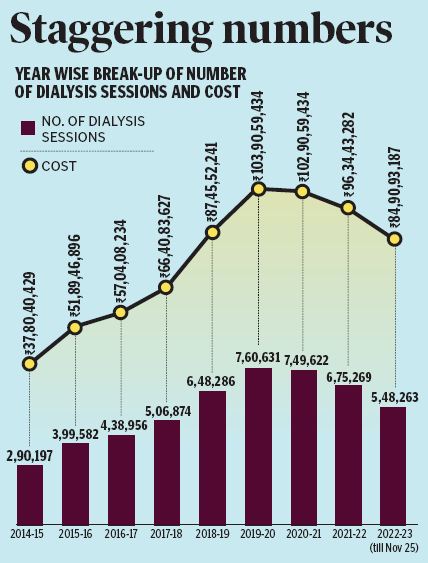Health and Tech: Telangana clocks 50 lakh free dialysis sessions
The initiative not only has provided a better and safer alternative to poor patients with chronic kidney ailments but also has successfully leveraged medical technology as a solution for a major public health issue of kidney ailments.
Published Date - 14 December 2022, 11:59 PM
Hyderabad: One of the enduring technology-driven public healthcare initiatives in Telangana that many other State governments would find difficult to replicate is the ongoing free dialysis facilities for poor patients, which touched a milestone of conducting a staggering 50 lakh free dialysis sessions in over 80 government hospitals.
The initiative not only has provided a better and safer alternative to poor patients with chronic kidney ailments but also has successfully leveraged medical technology as a solution for a major public health issue of kidney ailments.
In a way, the initiative paved the way for the State government to offer a holistic kidney healthcare package to poor patients that includes weekly three to four dialysis sessions, free consultation with nephrologists, access to erythropoietin supplement to improve anaemic condition and their quality of life, registration in Jeevandan for cadaver donor kidneys, free kidney transplant facilities in government hospitals, which is reimbursed up to Rs 10 lakh through Aarogyasri health insurance scheme, along with lifelong supply of medicines needed post-kidney transplant surgery.

A unique aspect of the initiative was its ability to offer technologically advanced dialysis sessions for free of cost. At the time of its launch in 2014-15, the average dialysis session at a private hospital in Hyderabad used to hover between Rs 5,000 and Rs 8,000. Due to the prohibitive costs in private sector, it was literally a death sentence for poor chronic kidney patients who needed to undergo regular dialysis but could not afford. As a result, a majority of such patients would struggle to adhere and give-up, ultimately leading to kidney failure and death.
At that time (2014-15), there were only three government hospitals including NIMS, Osmania General Hospital (OGH) and Gandhi Hospital providing free dialysis. Before the launch of the initiative, providing free kidney dialysis to needy patients at a massive scale was unheard of, as there was always a risk of rise of infections and heavy expenses.
To reduce the cost of conducting dialysis sessions and also to avoid incurring massive financial burden while procuring expensive dialysis equipment, the State government directly collaborated with international dialysis equipment manufacturers. As a result, despite high-end and expensive dialysis technology at that time, Telangana government managed to conduct a single dialysis session for kidney patients, for below Rs 1,500, which was reimbursed to the dialysis manufactures. The drastic reduction of cost in conducting a single dialysis sessions also forced private operators to think out of the box and reduce their costs.
Technology to reduce infections among dialysis patients:
With experience and feedback from patients and care givers, the State government also took a significant decision to launch single-use dialyzers, which was expensive than the normal dialysis but went a long way in reducing infections among kidney patients.
Till then, dialyzers and other medical tubes used for dialysis were utilised for multiple number of times, which increased the risk of Hepatitis infection among patients. With the advent of dialyzer technology, despite it being expensive, the State government decided to adopt it to reduce infections and conduct dialysis in a safe manner.
A dialyzer is a component of dialysis machine and is an artificial filter containing fine hollow fibres that have microscopic pores in its walls. The pores are called as semi-permeable dialysis membranes and the toxins are removed when the dialysis-fluid flows through the artificial filter. Thanks to advancements in technology and innovation, the availability of single-use dialyzers has improved, enabling health department to make it available on a large scale for all kidney patients.